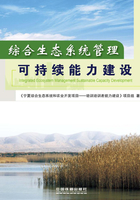
Executive summary
1.Ningxia Integrated Ecosystem Management Project(IEM)(hereinafter called“The Project”)is the largest ecological and agricultural development project in Ningxia Province,which utilizes loan fund from international financial organization-Asian Development Bank(ADB).The project is the first project applying IEM concepts and methods in Ningxia Province even in RPC,especially for the concept of Farm Field School(FFS)that stands on a promising level in RPC.Meanwhile,the project is creative in the respect of the institutional capacity development and the sustainable capacity building among ADB's or World Bank's(WB)projects.At the ADB Project Review Workshop,held by MOF(Ministry of Finance)and ADB in 2013,the project was awarded as outstanding achievement and the Best Performance Project out of 67 projects in 2012.
2.Under the guidance of ADB,as per the project framework,the project team conducted the Training of Trainer Project(ToT Project),aiming at improving capacity building in project areas and providing service for capacity building in the agricultural fields in Ningxia Province as well.
3.In order to ensure smooth progress of training,ToT project conducted SWOT analysis in 6 fields,including agricultural production,wetland management,irrigation,land planning,livestock farming and vineyard management.Through SWOT analysis,internal advantages and disadvantages,external opportunities and threats in subjects and fields have been identified.The SWOT matrix and action plan were developed.Another action plan for sectoral sustainable development was also provided.The training needs,skills and capacity of potential trainers were identified through questionnaire survey.
4.According to the investigation results of the training needs,the training courses were divided into 7 subjects,including soil and protective farming,agricultural production,wetland management,irrigation,integral control of water and fertilization,livestock farming and vineyard management.Training materials and documents were compiled on the basis of course structure of each subject.
5.The training activities consist of three types:
·Theoretical training,i.e. classroom teaching of each subject.
·Interdisciplinary training,such as soil and protective farming,irrigation,integral control of water and fertilization and vineyard management.The training included the Integrated Ecosystem Management Training (IEM).
·Field training,which conducted in groups and aims to resolve production problems according to the farming season.Farmer's field school was established,training for instructors was conducted and field training was strengthened in practical technologies.
6.The project developed training evaluation and assessment system for trainers.In training process,the evaluation forms for of the ToT were designed for gradual assessment of core trainers.All training activities were evaluated and evaluation reports were compiled for all trainings.Core trainers were assessed by expert group.
7.SWOT analysis was carried out for different subjects and fields,including agriculture production,wetland management,livestock farming and vineyard management.
8.The ToT project obtains successful outputs.Training subjects includes 8 subjects,i.e.IEM training,protective farming,agriculture,integral control of water and fertilizer,irrigation,livestock farming,vineyard management and wetland management.Among 74 training activities,classroom training took 43 times accounting for 58.1% of the total training activities;field training took 31 times with 41.9% of the total.11 experts participated in the activities with 3 international experts and 61 trainers has qualified by the project training.
9.The training courses were designed according to the investigation results of the training needs and adjusted during the training progress on the basis of the evaluation results.The training curriculum combine sole subject training with integrated subjects training with following training methods adopted:
·Main teaching methods included classroom teaching,field demonstration and practical operation,investigation,field guidance etc.
·Training workshop for farmer's field school was carried out by experienced specialists through learning of domestic and regional experience in the farmer field schools.
·Farmer's field school was established according to the developed program.
·Interdisciplinary training was strengthened to improve training effects.
·The trainers was gradually selected and more focus on core trainers.
·The training evaluation system was established,improved and implemented in the project process.
10.10 training materials and 500 hours of teaching materials in electronic version were completed.Training materials invovles Principles and Techniques of Conservation Tillage;Q&A of Conservation Tillage Technology;Crop Management Training Manual;Viticulture Technical Manual;Farming Technical Regulations for Large-scale Dairy Farms;Dairy Farming and Feeding Techniques Manual;High-grade Cattle Feeding Techniques Manual;Integrated Water and Fertilizer Technical Manual;Irrigation Systems Manual;Wetlands and Biodiversity Conservation Manual.
11.During the implementation of the project,in addition to the completion of the project report,4 reports and planning were compiled,including the “Farm Field School(FFS)Construction Guide”,“Ecological Agriculture Dairy Cattle model”,“Water and Soil Research Program”and “Sustainable Agriculture Training Plan in Ningxia Province”.
12.Through the ToT project training,key trainer's quality has been greatly improved.A large number of technical personnel and a strong trainer team has been reserved in the project areas.The“Farmer Field School(FFS)Construction Guide”and the establishment of “Yuquanying Grape Farmers Field School”improved the ability of the training institutions and provided organizational guarantee for the further training activities.
13.The ToT project focused on enhancing quality and efficiency regarding the development strategy of wine grapes.The production concept was changed from high yield to high quality,and played a positive role on the promotion of grape quality.
14.In the process of implementation facing several problems,such as the rapid expansion of dairy industry in Ningxia Province,extensive management during farming progress,high prevalence and low cure rate of subclinical mastitis,the demonstrative farm planning activities were carried out with the focal points on cow's healthy breeding and the“Demonstrative Ecological Dairy Farming Planning”.The planning attracted the attention of relevant departments and lay the foundation for dairy farm planning.
15.With the further advancement of the ToT project and the further development of agriculture industry structure adjustment in Ningxia province,it is necessary to strengthen the sustainable agricultural development capacity and to enhance the level of sectorial development.Following works should be further strengthened:concept of ToT project still needs to be extended into a larger range;wine grape quality and production efficiency shall be improved in both concept and technology;farmer field schools shall continuously contribute to project,but still faces challenges;trainer's enthusiasm and capacity shall be activated and applied to strengthen the results of project training.